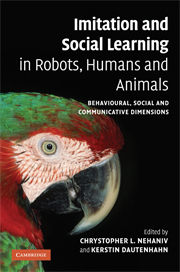 Imitation and Social Learning in Robots, Humans and Animals
Imitation and Social Learning in Robots, Humans and Animals Published online by Cambridge University Press: 10 December 2009
As the chapters in this book attest, during the last decade the study of imitation has become a topic of central importance through a diverse range of disciplines. There have been a greater number of controlled studies of imitation in non-human animals than ever before. Possible neural foundations of imitation have been identified. Encouraging progress has been made in developing imitation in constructed systems. Our understanding of the processes and mechanisms of imitation has been markedly advanced. Nonetheless, during this period most researchers have primarily focused on how imitation facilitates the acquisition of new skills or behaviours. In so doing, some important aspects of imitation have been neglected. In human development, infants imitate for a wide variety of reasons, both within and across different developmental stages and within and across different contexts. More specifically, for human infants imitation is an important form of pre-verbal communication that provides a means by which they can engage in social interaction. Our aim in this chapter is to provide an overview of the evidence that infants imitate not only to acquire new skills but also to engage socially with others, and this social engagement can itself take a number of different forms, with imitation being used flexibly as a means to various social ends.
Before going further a brief note on definition is warranted.
To save this book to your Kindle, first ensure [email protected] is added to your Approved Personal Document E-mail List under your Personal Document Settings on the Manage Your Content and Devices page of your Amazon account. Then enter the ‘name’ part of your Kindle email address below. Find out more about saving to your Kindle.
Note you can select to save to either the @free.kindle.com or @kindle.com variations. ‘@free.kindle.com’ emails are free but can only be saved to your device when it is connected to wi-fi. ‘@kindle.com’ emails can be delivered even when you are not connected to wi-fi, but note that service fees apply.
Find out more about the Kindle Personal Document Service.
To save content items to your account, please confirm that you agree to abide by our usage policies. If this is the first time you use this feature, you will be asked to authorise Cambridge Core to connect with your account. Find out more about saving content to Dropbox.
To save content items to your account, please confirm that you agree to abide by our usage policies. If this is the first time you use this feature, you will be asked to authorise Cambridge Core to connect with your account. Find out more about saving content to Google Drive.